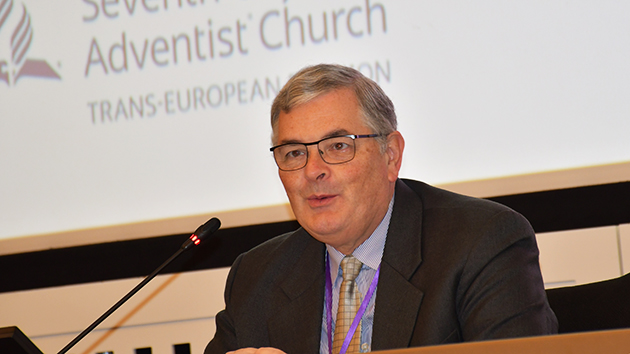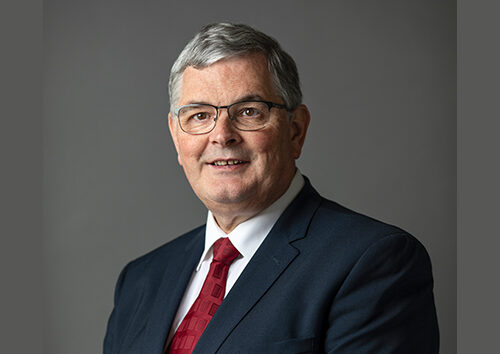25 October 2023 | Budva, Montenegro [David Neal]
When the 44 members and 39 Trans-European Division (TED) Executive Committee invitees met together for the opening session of the 2023 Year-End Meetings in Budva, Montenegro, the song ‘Blessed Assurance’ began proceedings. With members in ‘ready for business’ mode and singing with a sense of cheer, most on this occasion, as Daniel Duda, TED president, noted, “will not have given too much thought to the words given their familiarity.”
Creating an instant teachable moment, Duda gave an invitation to sing the song again – to the same tune with its slow-moving harmony, but to alternative lyrics:
Blessed Disturbance
Blessed disturbance, Jesus still reigns.
Heav’nly disruption of “everything’s fine!”
Holy traditions, our sacred cows,
Altered by heaven, slain from above.
Refrain:
It is HIS story! It is HIS song!
It is HIS kingdom! Future redrawn!
Tell the old story, write a new song:
“Jesus disturb us all our life long.”
Perfect submission?? Perfect delight??
Visions of heartbreak burst on my sight.
Broken and barely piercing the clouds,
Echoes of mercy, whispers of love.
Refrain:
Tell me a story, sing of His Son,
Born, crucified, risen and not done
Tell me your story, write me a song!
Tell me of Him to whom we belong.
Perfect subversion: arousal and rest.
We, in our Saviour, bothered and blessed,
Working and waiting, wrecked from above,
Live in his goodness, lost in his love.
Refrain:
Teach us YOUR story! Alter our song!
Guide us, dear Jesus! Warn when we’re wrong!
This be our story, this be our song.
“Jesus disturb us all our life long.”
(Harald Giesebrecht & Daniel Duda version)
Signalling intent to continue the conversation about TED strategic values, Duda noted, “Unless we are sensitive to your guidance, we cannot do what we are called to do.” This year’s strategic conversation is ‘Grow lifelong disciples – across all generations’.
The President’s Challenge
“Discipleship is not something we talked about 50 years ago”, Duda remarked. “If you pay, pray and obey, and that’s all that’s expected of you, then why are we here? What’s the purpose of our existence?” Recognising that Matthew 28:19-20 is frequently given the motif, “We are here to do evangelism”, he continued, “Do you know the text where Jesus forbids evangelism? In Matthew 23:15 – Jesus challenges the scribes and Pharisees. When their converts joined the religion of the one and true God – they were twice as likely to be lost than before!” For this reason, Duda continued, “ Evangelism cannot be the sole purpose of our existence.”
If Seekers Become Followers, if Followers Become Disciples, What Would the Outcome Be?
And challenging Executive Committee members, Duda mused: “If seekers become followers, if followers become disciples, what would the outcome be? We need a culture of discipleship. If not, we fall into a position where we think the twenty-eight Fundamental beliefs are our entry card to heaven. People don’t change for years; there’s no growth, and the tragedy is that we don’t care!”
“And this matters to us about how we do mission in Europe”, said Duda, applying context. Over the centuries, the cause of Christianity has been abused in the name of Christianity. “Take, for example, the 30-year and the 100-year war and how we treated each other – clear examples of arguments against Christianity. In contrast, “Have you ever noticed”, he said, “most of the ministry of Jesus was to correct misunderstandings about who God is”? Quoting Ellen White, Duda reinforced the contrast. “The strongest argument favouring the gospel is a loving and loveable Christian. (Ministry of Healing p. 253).
As Duda concluded his challenge, he invited members to “put on the character of Jesus Christ. While focussing on having the right fundamental beliefs – we seemed to have not been so concerned about having the wrong character.”
Grace Based Transformation
Duda left listeners with three points to reflect on:
- Grace-based transformation must be at the top of the list of our core values. That is the goal.
- As a church, we are here to be a dispenser of God’s transforming grace, individually and corporately.
- Are you an apprentice of Jesus? Or just a fan? How can you tell the difference? Fans are in it for themselves; disciples are in it for God.

Heartfelt Conversation
“Let’s have a time of discussion,” Duda invited. In the spirit of the challenge, a heartfelt conversation followed.
Kayle de Waal (Disciple-Making Director, TED)
Discipleship has to be relational, slow, simple, small and is a cost. And the cool thing about Jesus is that he put the price upfront. Changing the culture of a church is at least a 3 to 5-year journey. The relational dynamic is critical for both discipleship and disciple-making. Discipleship is a slow journey in community, as is disciple-making – in Trinitarian life.
Can I give a gentle challenge? As leaders, I pray the Spirit will prompt us to model this life. To begin leading, continually giving away ministry, leadership, and continuously empowering others.
Can I also speak frankly when it comes to our pastors and discipleship? They understand the principle, and there’s no question about that… but like our culture, our members can sometimes be individualists. And some of our pastors struggle to help their members make the critical paradigm shift. We should not be surprised because Jesus had the same challenge with his disciples.
But what I do know is that prayer precedes disciple-making! And if we are ever to progress on this, we need to call on the support of the Holy Spirit and one another – because it is challenging work. Grace-based transformation doesn’t happen in isolation – it happens in a community.
Gavin Anthony (President, Iceland Conference)
My greatest fear is that no change has happened because we have put this new sticker on whatever we did before. What could we do to create new material that connects with our members and provides new definitions so that members know we are talking about something radically different from what we have previously understood as discipleship? We must do something radical to help members connect with a new understanding of discipleship and disciple-making.
Alison Awuku (Lay Representative, British Union Conference)
What does grace-based transformation look like? What challenges do people face inside the church because we experience many issues that stop us from engaging spiritually and practically as disciples? How do we support each other in the church? I ask this because we can’t be what we don’t have.
Victor Marley (President, Norwegian Union Conference)
I appreciate the relational focus of your presentation. This is an essential matter for the church in Europe. Some of our older members talk about when they ‘came to the truth’. Well, as I understand discipleship, it’s about being on ‘the journey’ on ‘the way’ together.
In the Norwegian Union, before we talk about what we want to do, we talk about how we want to do it based on our three values: faithful as Jesus is faithful, generosity in how we treat one another, and active caring for ‘the least of these’. These have been helpful for the Union leadership team as we have been confronted with difficult situations.
In a recent ‘What is the state of the church?’ survey, we discovered that 40% of our members are unsure whether our Norway church is inclusive. 40% indicated they are uncertain about how well we do with relationships. And 60% of our members are uncertain about our ‘conflict resolution’ effectiveness and whether we are getting it right.
The message for us is that we’ve got some relational issues to work with. If we are going to talk seriously about discipleship, then we’ve got to talk seriously about relationships.
Kirk Thomas (President, South England Conference)
If we want our members to engage with the concept of discipleship, we need to help them understand the evangelism cycle. Perhaps this will only happen when we request them to ‘stop what you are doing’ in our programme-saturated churches. And then we hope they can consider again how we can implement the true spirit of what Jesus meant about discipleship and evangelism.
How will youth connect with this new paradigm? How do they relate to the church today? Does the church make sense to them? When we look again at discipleship, we must factor in how we appeal to them.
Matthew Herel (Pastoral Representative, British Union Conference)
I found your presentation both moving and brave, counter-cultural to what we often hear in our church. To be described as ‘a grace-filled church’ can seem, for many members, an abstract concept. What does that mean? What does that look like? And how do we get there?
Would it be possible to produce a practical guide giving five or six steps to transition to being a ‘safe space’ church? And as far as such matters can be measured, are we more grace-filled in our relationships than we were six months ago / a year ago / five years ago?
Jacques Venter (Associate Executive Secretary, British Union Conference)
I want to encourage us to tell ‘more stories’ about how our life connects with Christ’s. This, to me, is appropriate for connecting with the community in this generation and territory.
Patrick Johnson (Ministerial Secretary, TED)
What do we measure? Because that’s what seems essential in people’s minds. If we want to change the focus to becoming loveable people – what metric do we use?
Also, we need to consider the matter of emotional health. Is it possible to be spiritually mature without being emotionally mature?
Terje Dahl (Treasurer, Swedish Union of Churches)
Jesus is a change-maker. He wanted to change not only one life but the whole community. I currently have the privilege of being a politician. With my party, we are trying to make changes in the community for the better. We are calling for ‘involvement’ in the community, just like the church is trying to make a difference in the lives of those we live with. When we are involved in the community, that is when we can say we are following Jesus.
Želimir Stanić (Executive Secretary, South-East European Union Conference)
When I recently challenged a person in the most gentle way about smoking in a prohibited place, the response was, “And who are you to tell me that?” This is the typical response in my country when people are confronted with change. If you want to make a change, you must have some authority. That may come when we live the grace-based transformation before giving others the challenge.
Guillermo E. Biaggi (General Vice President, General Conference)
What can we do to make the change? With an ageing church membership, what is the future? Why don’t we make the new discipleship paradigm something that connects big time with teens and youth? Are we giving the pulpit to young people to preach? Are we mentoring young people to leadership positions, such as Elders? Could a young Elder be paired and mentored by an older, experienced Elder? It is a matter we need to pray about.
The meeting concluded with a request For TED Union leaders to continue the discussion at their Year-End Meetings.
[Photo: Vanesa Pizzuto]



